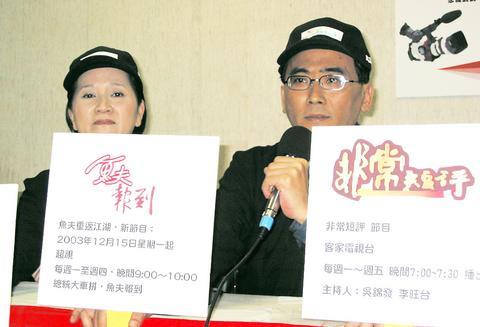An online television channel was launched by a group of four experienced media figuers yesterday to provide a forum for members of the public to voice their opinions.
"This online TV channel allows the public to send in their DV [digital video] clips, and we will publish these clips online and even on the TV shows that we host," said Lin Kuei-you (林奎佑), who is widely known as Yu-fu (魚夫).

PHOTO: CNA
The other three founders of the channel, called F4, are actress Chiang Hsia (江霞), writer Wu Jin-fa (吳錦發) and Soochow University professor Shieh Jhy-wey (謝志偉). All four have been wrongly accused of staffing the behind-the-scenes production team of the Special Report VCD series.
Lin, Wu and Hsieh currently host their own TV talk shows on current affairs.
"The clips should be entertaining, funny and creative. Of course, the contents of all clips should be legal and ethical. If you don't know how digital video works, just ask your children or grandchildren -- they will know all about it," Lin said.
Chiang said the name F4 re-presents the four ethnic groups in Taiwan that are represented by the four founders.
"Lin has Aboriginal heritage, Shieh is a Mainlander, Wu is Hakka and I am Taiwanese," Chiang said.
The logo of F4 TV is four connected rings.
"This represents the unification of all four ethnic groups," Chiang said.
Wu said capitalism has infiltrated the Taiwanese media in recent years.
"Since the turn of the century, the media has been invaded by rich investors. As a result, the news that is represented to the public has become biased and prejudiced, and represents the personal opinions of these investors. Therefore, in establishing this online television channel, we hope to promote public opinions being voiced in a public space," Wu said.
According to Shieh, "it used to be that the media observed the public, but now it is the public who is keeping an eye on the media."
Lin said F4 planned to raise NT$6 million to support the technical needs of the Web site.
"NT$100 per person from 60,000 people will be enough to send F4 into full operation. Before then, outstanding digital clips will be shown on our TV shows," Lin said.
F4 TV has a team of four attorneys to protect the rights of individuals whose clips have been published in case of litigation.
The Web site for the F4 TV channel is: http://www.f4tv.tv.

Alain Robert, known as the "French Spider-Man," praised Alex Honnold as exceptionally well-prepared after the US climber completed a free solo ascent of Taipei 101 yesterday. Robert said Honnold's ascent of the 508m-tall skyscraper in just more than one-and-a-half hours without using safety ropes or equipment was a remarkable achievement. "This is my life," he said in an interview conducted in French, adding that he liked the feeling of being "on the edge of danger." The 63-year-old Frenchman climbed Taipei 101 using ropes in December 2004, taking about four hours to reach the top. On a one-to-10 scale of difficulty, Robert said Taipei 101

Nipah virus infection is to be officially listed as a category 5 notifiable infectious disease in Taiwan in March, while clinical treatment guidelines are being formulated, the Centers for Disease Control (CDC) said yesterday. With Nipah infections being reported in other countries and considering its relatively high fatality rate, the centers on Jan. 16 announced that it would be listed as a notifiable infectious disease to bolster the nation’s systematic early warning system and increase public awareness, the CDC said. Bangladesh reported four fatal cases last year in separate districts, with three linked to raw date palm sap consumption, CDC Epidemic Intelligence

Two Taiwanese prosecutors were questioned by Chinese security personnel at their hotel during a trip to China’s Henan Province this month, the Mainland Affairs Council (MAC) said yesterday. The officers had personal information on the prosecutors, including “when they were assigned to their posts, their work locations and job titles,” MAC Deputy Minister and spokesman Liang Wen-chieh (梁文傑) said. On top of asking about their agencies and positions, the officers also questioned the prosecutors about the Cross-Strait Joint Crime-Fighting and Judicial Mutual Assistance Agreement, a pact that serves as the framework for Taiwan-China cooperation on combating crime and providing judicial assistance, Liang

US climber Alex Honnold left Taiwan this morning a day after completing a free-solo ascent of Taipei 101, a feat that drew cheers from onlookers and gained widespread international attention. Honnold yesterday scaled the 101-story skyscraper without a rope or safety harness. The climb — the highest urban free-solo ascent ever attempted — took just more than 90 minutes and was streamed live on Netflix. It was covered by major international news outlets including CNN, the New York Times, the Guardian and the Wall Street Journal. As Honnold prepared to leave Taiwan today, he attracted a crowd when he and his wife, Sanni,